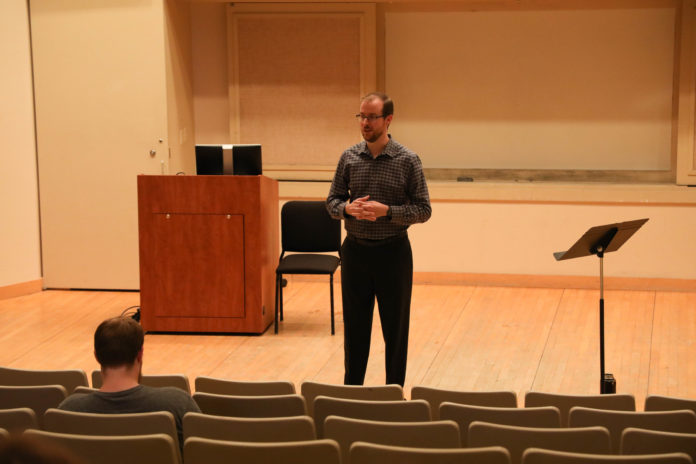By Harry Rowe | Staff Writer
Dr. Travis Baird, a performance coach and founder of Travis Baird Coaching, spoke to a room full of Baylor students about the craziness of organizing various components of life and how one can truly maximize their potential without spreading themselves too thin.
The hour-long interactive workshop, titled “Managing a Portfolio Career: Getting Organized, Setting Priorities & Achieving Goals” took place at 5:30 p.m. in the Meadows Recital Hall in the McCrary Music building. The talk, targeted toward student musicians but open to the public, was part of a two-part series of career development sessions given by Baird.
“By developing these skills, what you’ll be able to do is build sustainable habits that prevent getting distracted, that prevent feeling overwhelmed and to consistently come back to why this is important to you in a way that will actually allow you to succeed,” Baird said.
Baird said he took every opportunity available to him when he was getting his doctorate. As a self-proclaimed overachiever, Baird wanted to get most out of every experience. Within a year, Baird realized he had completely overloaded himself and could not work on anything. He didn’t have enough time to complete anything.
“What that led to is ultimately feeling disconnected from why I even wanted to be a musician,” said Baird. “I started questioning, ‘Do I want to do this? Do I want to perform? Do I really want to teach?’ I couldn’t really tell if I cared anymore because I was spread so thin, and I couldn’t really tell what was important because I was doing so many different things.”
Baird told the room to imagine a goal to achieve for the next year. He said some major questions to ask when creating new goals are: How does it makes you feel? Do you know where to start? Do you feel capable? and Will it fit into your life at the moment?
Baird said when evaluating if one has accomplished a goal, factors to consider can range depending on where someone is at at any given point in their life.
“For every goal you have in your range of possibilities — it doesn’t have to be yes or no, but if it’s not right now, then find a way to capture that idea,” Baird said. “If you want to capture the idea so you can come back to it later, go for it; write it down. That way you don’t have that stress about leaving it behind.”
Baird’s system for organization is something he uses daily. His system, GEARS, is an acronym for a way to keep tract of everything one must do for the day. The G stands for setting a single goal for the day (that can be switched out once completed). The E, for events, is noting events that have a direct time attached to them. The A is three to five actions that need to be completed but have no time attached to them. R is for rest ending your work day, and S is for satisfaction, setting aside time for each day for something that you truly love and enjoy. If you can’t find an S, Baird says to create one.
Throughout his talk, Baird strongly emphasized the importance of being conscious of one’s “why”, or reason for pursuing their career. He argued that it is all too easy for someone to become lost and feel apathetic toward what they do.
Dr. Kathryn Steely, professor of viola, was partly responsible for getting Baird to come speak. She thinks students can take valuable knowledge from his experience, especially in today’s world.
“Increasing numbers of young professionals, not just musicians, that are entering a changing job market and are finding ways to build a portfolio of income streams that allow them to successfully earn a living doing a variety of things that they really enjoy,” Steely said. “It is important for students to hear from young professionals who are creatively and successfully developing portfolio careers since this may be an option they decide to pursue in the future.”






